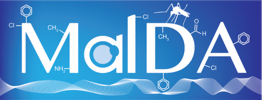A Variant PfCRT Isoform Can Contribute to Resistance to the First-Line Partner Drug Piperaquine.
Journal:
mBio, Volume: 8, Issue: 3Abstract:
Current efforts to reduce the global burden of malaria are threatened by the rapid spread throughout Asia of resistance to artemisinin-based combination therapies, which includes increasing rates of clinical failure with dihydroartemisinin plus piperaquine (PPQ) in Cambodia. Using zinc finger nuclease-based gene editing, we report that addition of the C101F mutation to the chloroquine (CQ) resistance-conferring PfCRT Dd2 isoform common to Asia can confer PPQ resistance to cultured parasites. Resistance was demonstrated as significantly higher PPQ concentrations causing 90% inhibition of parasite growth (IC) or 50% parasite killing (50% lethal dose [LD]). This mutation also reversed Dd2-mediated CQ resistance, sensitized parasites to amodiaquine, quinine, and artemisinin, and conferred amantadine and blasticidin resistance. Using heme fractionation assays, we demonstrate that PPQ causes a buildup of reactive free heme and inhibits the formation of chemically inert hemozoin crystals. Our data evoke inhibition of heme detoxification in the parasite’s acidic digestive vacuole as the primary mode of both the -aminoquinoline PPQ and the related 4-aminoquinoline CQ. Both drugs also inhibit hemoglobin proteolysis at elevated concentrations, suggesting an additional mode of action. Isogenic lines differing in their copy number showed equivalent PPQ susceptibilities. We propose that mutations in PfCRT could contribute to a multifactorial basis of PPQ resistance in field isolates. The global agenda to eliminate malaria depends on the continued success of artemisinin-based combination therapies (ACTs), which target the asexual blood stages of the intracellular parasite Partial resistance to artemisinin, however, is now established in Southeast Asia, exposing the partner drugs to increased selective pressure. resistance to the first-line partner piperaquine (PPQ) is now spreading rapidly in Cambodia, resulting in clinical treatment failures. Here, we report that a variant form of the chloroquine resistance transporter, harboring a C101F mutation edited into the chloroquine (CQ)-resistant Dd2 isoform prevalent in Asia, can confer PPQ resistance in cultured parasites. This was accompanied by a loss of CQ resistance. Biochemical assays showed that PPQ, like CQ, inhibits the detoxification of reactive heme that is formed by parasite-mediated catabolism of host hemoglobin. We propose that novel PfCRT variants emerging in the field could contribute to a multigenic basis of PPQ resistance.
